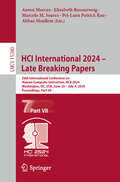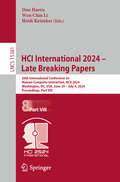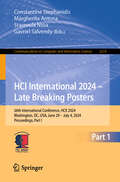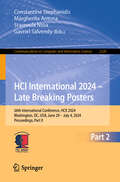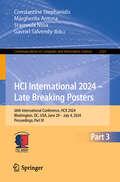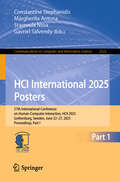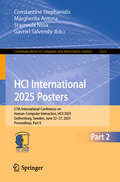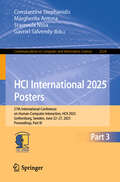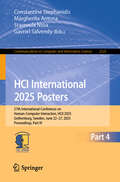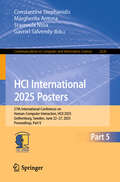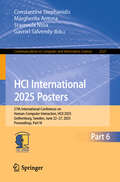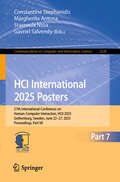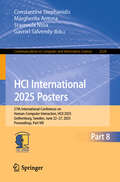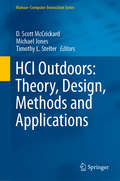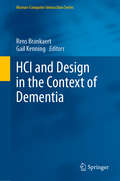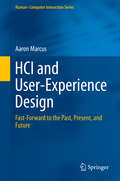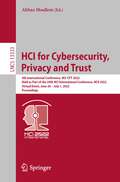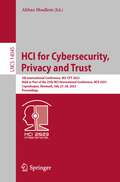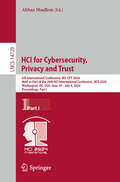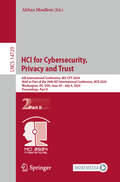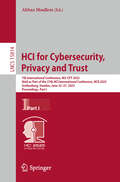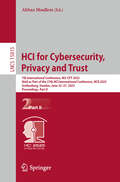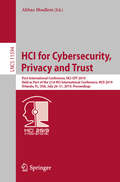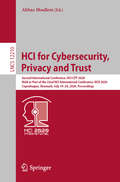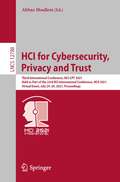- Table View
- List View
HCI International 2024 – Late Breaking Papers: 26th International Conference on Human-Computer Interaction, HCII 2024, Washington, DC, USA, June 29 – July 4, 2024, Proceedings, Part VII (Lecture Notes in Computer Science #15380)
by Aaron Marcus Pei-Luen Patrick Rau Marcelo M. Soares Abbas Moallem Elizabeth RosenzweigThis nine-volume set LNCS 15473-15482 constitutes the proceedings of the 26th International Conference, HCI International 2023, in Washington, DC, USA, in June/July 2024. For the HCCII 2024 proceedings, a total of 1271 papers and 309 posters was carefully reviewed and selected from 5108 submissions. Additionally, 222 papers and 104 posters are included in the volumes of the proceedings published after the conference, as “Late Breaking Work”. These papers were organized in the following topical sections: HCI Theories, Methods and Tools; Multimodal Interaction; Interacting with Chatbots and Generative AI; Interacting in Social Media; Fintech, Consumer Behavior and the Business Environment; Design for Health and Wellbeing; Ergonomics and Digital Human Modelling; Virtual Experiences in XR and the Metaverse; Playing Experiences; Design for Learning; New Cultural and Tourism Experiences; Accessibility and Design for All; Design for Older Adults; User Experience Design and Evaluation: Novel Approaches and Case Studies; Safety, Security and Privacy; HCI in Automated Vehicles and Automotive; HCI in Aviation, Transport and Safety; Human-Centered AI; AI for Decision Making and Sentiment Analysis.
HCI International 2024 – Late Breaking Papers: 26th International Conference on Human-Computer Interaction, HCII 2024, Washington, DC, USA, June 29 – July 4, 2024, Proceedings, Part VIII (Lecture Notes in Computer Science #15381)
by Don Harris Heidi Krömker Wen-Chin LiThis nine-volume set LNCS 15473-15482 constitutes the proceedings of the 26th International Conference, HCI International 2023, in Washington, DC, USA, in June/July 2024. For the HCCII 2024 proceedings, a total of 1271 papers and 309 posters was carefully reviewed and selected from 5108 submissions. Additionally, 222 papers and 104 posters are included in the volumes of the proceedings published after the conference, as “Late Breaking Work”. These papers were organized in the following topical sections: HCI Theories, Methods and Tools; Multimodal Interaction; Interacting with Chatbots and Generative AI; Interacting in Social Media; Fintech, Consumer Behavior and the Business Environment; Design for Health and Wellbeing; Ergonomics and Digital Human Modelling; Virtual Experiences in XR and the Metaverse; Playing Experiences; Design for Learning; New Cultural and Tourism Experiences; Accessibility and Design for All; Design for Older Adults; User Experience Design and Evaluation: Novel Approaches and Case Studies; Safety, Security and Privacy; HCI in Automated Vehicles and Automotive; HCI in Aviation, Transport and Safety; Human-Centered AI; AI for Decision Making and Sentiment Analysis.
HCI International 2024 – Late Breaking Posters: 26th International Conference, HCII 2024, Washington, DC, USA, June 29 – July 4, 2024, Proceedings, Part I (Communications in Computer and Information Science #2319)
by Gavriel Salvendy Margherita Antona Constantine Stephanidis Stavroula NtoaThe three-volume set CCIS 2319-2321 constitutes the proceedings of the 26th International Conference on Human-Computer Interaction, HCII 2024, held in Washington, DC, USA, during June 29–July 4, 2024. For the HCII 2024 proceedings, a total of 1271 papers and 309 posters was carefully reviewed and selected from 5108 submissions. Additionally, 222 papers and 104 posters are included in the volumes of the proceedings published after the conference, as “Late Breaking Work”. The posters presented in these three volumes are organized in the following topical sections: Part I: User Interface and Interaction Design; Usability and User Experience Evaluation; Innovative Technologies and Human-Centered Solutions. Part II: Innovations in Extended Reality; Smart Systems and Intelligent Design; AI and Design for Human-Centric Applications. Part III: Design for Health and Well-being; Advanced Interactive Technologies for Learning; Gaming, Gamification, and Immersive Design; Technology-Enhanced Experiences in Cultural Heritage.
HCI International 2024 – Late Breaking Posters: 26th International Conference, HCII 2024, Washington, DC, USA, June 29 – July 4, 2024, Proceedings, Part II (Communications in Computer and Information Science #2320)
by Gavriel Salvendy Margherita Antona Constantine Stephanidis Stavroula NtoaThe three-volume set CCIS 2319-2321 constitutes the proceedings of the 26th International Conference on Human-Computer Interaction, HCII 2024, held in Washington, DC, USA, during June 29–July 4, 2024. For the HCII 2024 proceedings, a total of 1271 papers and 309 posters was carefully reviewed and selected from 5108 submissions. Additionally, 222 papers and 104 posters are included in the volumes of the proceedings published after the conference, as “Late Breaking Work”. The posters presented in these three volumes are organized in the following topical sections: Part I: User Interface and Interaction Design; Usability and User Experience Evaluation; Innovative Technologies and Human-Centered Solutions. Part II: Innovations in Extended Reality; Smart Systems and Intelligent Design; AI and Design for Human-Centric Applications. Part III: Design for Health and Well-being; Advanced Interactive Technologies for Learning; Gaming, Gamification, and Immersive Design; Technology-Enhanced Experiences in Cultural Heritage.
HCI International 2024 – Late Breaking Posters: 26th International Conference, HCII 2024, Washington, DC, USA, June 29 – July 4, 2024, Proceedings, Part III (Communications in Computer and Information Science #2321)
by Gavriel Salvendy Margherita Antona Constantine Stephanidis Stavroula NtoaThe three-volume set CCIS 2319-2321 constitutes the proceedings of the 26th International Conference on Human-Computer Interaction, HCII 2024, held in Washington, DC, USA, during June 29–July 4, 2024. For the HCII 2024 proceedings, a total of 1271 papers and 309 posters was carefully reviewed and selected from 5108 submissions. Additionally, 222 papers and 104 posters are included in the volumes of the proceedings published after the conference, as “Late Breaking Work”. The posters presented in these three volumes are organized in the following topical sections: Part I: User Interface and Interaction Design; Usability and User Experience Evaluation; Innovative Technologies and Human-Centered Solutions. Part II: Innovations in Extended Reality; Smart Systems and Intelligent Design; AI and Design for Human-Centric Applications. Part III: Design for Health and Well-being; Advanced Interactive Technologies for Learning; Gaming, Gamification, and Immersive Design; Technology-Enhanced Experiences in Cultural Heritage.
HCI International 2025 Posters: 27th International Conference on Human-Computer Interaction, HCII 2025, Gothenburg, Sweden, June 22–27, 2025, Proceedings, Part I (Communications in Computer and Information Science #2522)
by Gavriel Salvendy Margherita Antona Constantine Stephanidis Stavroula NtoaThe eight-volume set, CCIS 2522-2529, constitutes the extended abstracts of the posters presented during the 27th International Conference on Human-Computer Interaction, HCII 2025, held in Gothenburg, Sweden, during June 22–27, 2025. The total of 1430 papers and 355 posters included in the HCII 2025 proceedings were carefully reviewed and selected from 7972 submissions. The papers presented in these eight volumes are organized in the following topical sections: Part I: Virtual, Tangible and Intangible Interaction; HCI for Health. Part II: Perception, Cognition and Interaction; Communication, Information, Misinformation and Online Behavior; Designing and Understanding Learning and Teaching experiences. Part III: Design for All and Universal Access; Data, Knowledge, Collaboration, Research and Technological Innovation. Part IV: Human-Centered Security and Privacy; Older Adults and Technology; Interacting and driving. Part V: Interactive Technologies for wellbeing; Game Design; Child-Computer Interaction. Part VI: Designing and Understanding XR Cultural Experiences; Designing Sustainable (Smart) Human Environments. Part VII: Design, Creativity and AI; eCommerce, Fintech and Customer Behavior. Part VIII: Interacting with Digital Culture; Interacting with GenAI and LLMs.
HCI International 2025 Posters: 27th International Conference on Human-Computer Interaction, HCII 2025, Gothenburg, Sweden, June 22–27, 2025, Proceedings, Part II (Communications in Computer and Information Science #2523)
by Gavriel Salvendy Margherita Antona Constantine Stephanidis Stavroula NtoaThe eight-volume set, CCIS 2522-2529, constitutes the extended abstracts of the posters presented during the 27th International Conference on Human-Computer Interaction, HCII 2025, held in Gothenburg, Sweden, during June 22–27, 2025. The total of 1430 papers and 355 posters included in the HCII 2025 proceedings were carefully reviewed and selected from 7972 submissions. The papers presented in these eight volumes are organized in the following topical sections: Part I: Virtual, Tangible and Intangible Interaction; HCI for Health. Part II: Perception, Cognition and Interaction; Communication, Information, Misinformation and Online Behavior; Designing and Understanding Learning and Teaching experiences. Part III: Design for All and Universal Access; Data, Knowledge, Collaboration, Research and Technological Innovation. Part IV: Human-Centered Security and Privacy; Older Adults and Technology; Interacting and driving. Part V: Interactive Technologies for wellbeing; Game Design; Child-Computer Interaction. Part VI: Designing and Understanding XR Cultural Experiences; Designing Sustainable (Smart) Human Environments. Part VII: Design, Creativity and AI; eCommerce, Fintech and Customer Behavior. Part VIII: Interacting with Digital Culture; Interacting with GenAI and LLMs.
HCI International 2025 Posters: 27th International Conference on Human-Computer Interaction, HCII 2025, Gothenburg, Sweden, June 22–27, 2025, Proceedings, Part III (Communications in Computer and Information Science #2524)
by Gavriel Salvendy Margherita Antona Constantine Stephanidis Stavroula NtoaThe eight-volume set, CCIS 2522-2529, constitutes the extended abstracts of the posters presented during the 27th International Conference on Human-Computer Interaction, HCII 2025, held in Gothenburg, Sweden, during June 22–27, 2025. The total of 1430 papers and 355 posters included in the HCII 2025 proceedings were carefully reviewed and selected from 7972 submissions. The papers presented in these eight volumes are organized in the following topical sections: Part I: Virtual, Tangible and Intangible Interaction; HCI for Health. Part II: Perception, Cognition and Interaction; Communication, Information, Misinformation and Online Behavior; Designing and Understanding Learning and Teaching experiences. Part III: Design for All and Universal Access; Data, Knowledge, Collaboration, Research and Technological Innovation. Part IV: Human-Centered Security and Privacy; Older Adults and Technology; Interacting and driving. Part V: Interactive Technologies for wellbeing; Game Design; Child-Computer Interaction. Part VI: Designing and Understanding XR Cultural Experiences; Designing Sustainable (Smart) Human Environments. Part VII: Design, Creativity and AI; eCommerce, Fintech and Customer Behavior. Part VIII: Interacting with Digital Culture; Interacting with GenAI and LLMs.
HCI International 2025 Posters: 27th International Conference on Human-Computer Interaction, HCII 2025, Gothenburg, Sweden, June 22–27, 2025, Proceedings, Part IV (Communications in Computer and Information Science #2525)
by Gavriel Salvendy Margherita Antona Constantine Stephanidis Stavroula NtoaThe eight-volume set, CCIS 2522-2529, constitutes the extended abstracts of the posters presented during the 27th International Conference on Human-Computer Interaction, HCII 2025, held in Gothenburg, Sweden, during June 22–27, 2025. The total of 1430 papers and 355 posters included in the HCII 2025 proceedings were carefully reviewed and selected from 7972 submissions. The papers presented in these eight volumes are organized in the following topical sections: Part I: Virtual, Tangible and Intangible Interaction; HCI for Health. Part II: Perception, Cognition and Interaction; Communication, Information, Misinformation and Online Behavior; Designing and Understanding Learning and Teaching experiences. Part III: Design for All and Universal Access; Data, Knowledge, Collaboration, Research and Technological Innovation. Part IV: Human-Centered Security and Privacy; Older Adults and Technology; Interacting and driving. Part V: Interactive Technologies for wellbeing; Game Design; Child-Computer Interaction. Part VI: Designing and Understanding XR Cultural Experiences; Designing Sustainable (Smart) Human Environments. Part VII: Design, Creativity and AI; eCommerce, Fintech and Customer Behavior. Part VIII: Interacting with Digital Culture; Interacting with GenAI and LLMs.
HCI International 2025 Posters: 27th International Conference on Human-Computer Interaction, HCII 2025, Gothenburg, Sweden, June 22–27, 2025, Proceedings, Part V (Communications in Computer and Information Science #2526)
by Gavriel Salvendy Margherita Antona Constantine Stephanidis Stavroula NtoaThe eight-volume set, CCIS 2522-2529, constitutes the extended abstracts of the posters presented during the 27th International Conference on Human-Computer Interaction, HCII 2025, held in Gothenburg, Sweden, during June 22–27, 2025. The total of 1430 papers and 355 posters included in the HCII 2025 proceedings were carefully reviewed and selected from 7972 submissions. The papers presented in these eight volumes are organized in the following topical sections: Part I: Virtual, Tangible and Intangible Interaction; HCI for Health. Part II: Perception, Cognition and Interaction; Communication, Information, Misinformation and Online Behavior; Designing and Understanding Learning and Teaching experiences. Part III: Design for All and Universal Access; Data, Knowledge, Collaboration, Research and Technological Innovation. Part IV: Human-Centered Security and Privacy; Older Adults and Technology; Interacting and driving. Part V: Interactive Technologies for wellbeing; Game Design; Child-Computer Interaction. Part VI: Designing and Understanding XR Cultural Experiences; Designing Sustainable (Smart) Human Environments. Part VII: Design, Creativity and AI; eCommerce, Fintech and Customer Behavior. Part VIII: Interacting with Digital Culture; Interacting with GenAI and LLMs.
HCI International 2025 Posters: 27th International Conference on Human-Computer Interaction, HCII 2025, Gothenburg, Sweden, June 22–27, 2025, Proceedings, Part VI (Communications in Computer and Information Science #2527)
by Gavriel Salvendy Margherita Antona Constantine Stephanidis Stavroula NtoaThe eight-volume set, CCIS 2522-2529, constitutes the extended abstracts of the posters presented during the 27th International Conference on Human-Computer Interaction, HCII 2025, held in Gothenburg, Sweden, during June 22–27, 2025. The total of 1430 papers and 355 posters included in the HCII 2025 proceedings were carefully reviewed and selected from 7972 submissions. The papers presented in these eight volumes are organized in the following topical sections: Part I: Virtual, Tangible and Intangible Interaction; HCI for Health. Part II: Perception, Cognition and Interaction; Communication, Information, Misinformation and Online Behavior; Designing and Understanding Learning and Teaching experiences. Part III: Design for All and Universal Access; Data, Knowledge, Collaboration, Research and Technological Innovation. Part IV: Human-Centered Security and Privacy; Older Adults and Technology; Interacting and driving. Part V: Interactive Technologies for wellbeing; Game Design; Child-Computer Interaction. Part VI: Designing and Understanding XR Cultural Experiences; Designing Sustainable (Smart) Human Environments. Part VII: Design, Creativity and AI; eCommerce, Fintech and Customer Behavior. Part VIII: Interacting with Digital Culture; Interacting with GenAI and LLMs.
HCI International 2025 Posters: 27th International Conference on Human-Computer Interaction, HCII 2025, Gothenburg, Sweden, June 22–27, 2025, Proceedings, Part VII (Communications in Computer and Information Science #2528)
by Gavriel Salvendy Margherita Antona Constantine Stephanidis Stavroula NtoaThe eight-volume set, CCIS 2522-2529, constitutes the extended abstracts of the posters presented during the 27th International Conference on Human-Computer Interaction, HCII 2025, held in Gothenburg, Sweden, during June 22–27, 2025. The total of 1430 papers and 355 posters included in the HCII 2025 proceedings were carefully reviewed and selected from 7972 submissions. The papers presented in these eight volumes are organized in the following topical sections: Part I: Virtual, Tangible and Intangible Interaction; HCI for Health. Part II: Perception, Cognition and Interaction; Communication, Information, Misinformation and Online Behavior; Designing and Understanding Learning and Teaching experiences. Part III: Design for All and Universal Access; Data, Knowledge, Collaboration, Research and Technological Innovation. Part IV: Human-Centered Security and Privacy; Older Adults and Technology; Interacting and driving. Part V: Interactive Technologies for wellbeing; Game Design; Child-Computer Interaction. Part VI: Designing and Understanding XR Cultural Experiences; Designing Sustainable (Smart) Human Environments. Part VII: Design, Creativity and AI; eCommerce, Fintech and Customer Behavior. Part VIII: Interacting with Digital Culture; Interacting with GenAI and LLMs.
HCI International 2025 Posters: 27th International Conference on Human-Computer Interaction, HCII 2025, Gothenburg, Sweden, June 22–27, 2025, Proceedings, Part VIII (Communications in Computer and Information Science #2529)
by Gavriel Salvendy Margherita Antona Constantine Stephanidis Stavroula NtoaThe eight-volume set, CCIS 2522-2529, constitutes the extended abstracts of the posters presented during the 27th International Conference on Human-Computer Interaction, HCII 2025, held in Gothenburg, Sweden, during June 22–27, 2025. The total of 1430 papers and 355 posters included in the HCII 2025 proceedings were carefully reviewed and selected from 7972 submissions. The papers presented in these eight volumes are organized in the following topical sections: Part I: Virtual, Tangible and Intangible Interaction; HCI for Health. Part II: Perception, Cognition and Interaction; Communication, Information, Misinformation and Online Behavior; Designing and Understanding Learning and Teaching experiences. Part III: Design for All and Universal Access; Data, Knowledge, Collaboration, Research and Technological Innovation. Part IV: Human-Centered Security and Privacy; Older Adults and Technology; Interacting and driving. Part V: Interactive Technologies for wellbeing; Game Design; Child-Computer Interaction. Part VI: Designing and Understanding XR Cultural Experiences; Designing Sustainable (Smart) Human Environments. Part VII: Design, Creativity and AI; eCommerce, Fintech and Customer Behavior. Part VIII: Interacting with Digital Culture; Interacting with GenAI and LLMs.
HCI Outdoors: Theory, Design, Methods and Applications (Human–Computer Interaction Series)
by Michael Jones D. Scott McCrickard Timothy L. StelterAdvances in network connectivity, power consumption, and physical size create new possibilities for using interactive computing outdoors. However, moving computing outdoors can drastically change the human outdoor experience. This impact is felt in many kinds of outdoor activities such as citizen science, personal recreation, search and rescue, informal education, and others. It is also felt across outdoor settings that range from remote wilderness to crowded cities. Understanding these effects can lead to ideas, designs and systems that improve, rather than diminish, outdoor experiences. This book represents the current results emerging from recent workshops focused on HCI outdoors and held in conjunction with CHI, GROUP, UbiComp, and MobileHCI conferences. Based on feedback at those workshops, and outreach to other leaders in the field, the chapters collected were crafted to highlight methods and approaches for understanding how technologies such as handhelds, wearables, and installed standalone devices impact individuals, groups, and even communities. These findings frame new ways of thinking about HCI outdoors, explore logistical issues associated with moving computing outdoors, and probe new experiences created by involving computing in outdoor pursuits. Also important are the ways that social media has influenced preparation, experience, and reflection related to outdoor experiences. HCI Outdoors: Theory, Design, Methods and Applications is of interest to HCI researchers, HCI practitioners, and outdoor enthusiasts who want to shape future understanding and current practice related to technology in every kind of outdoor experience.
HCI and Design in the Context of Dementia (Human–Computer Interaction Series)
by Rens Brankaert Gail KenningOld age is currently the greatest risk factor for developing dementia. Since older people make up a larger portion of the population than ever before, the resulting increase in the incidence of dementia presents a major challenge for society. Dementia is complex and multifaceted and impacts not only the person with the diagnosis but also those caring for them and society as a whole. Human-Computer Interaction (HCI) design and development are pivotal in enabling people with dementia to live well and be supported in the communities around them. HCI is increasingly addressing the need for inclusivity and accessibility in the design and development of new technologies, interfaces, systems, services, and tools. Using interdisciplinary approaches HCI engages with the complexities and ‘messiness’ of real-world design spaces to provide novel perspectives and new ways of addressing the challenge of dementia and multi-stakeholder needs. HCI and Design in the Context of Dementia brings together the work of international experts, designers and researchers working across disciplines. It provides methodologies, methods and frameworks, approaches to participatory engagement and case studies showing how technology can impact the lives of people living with dementia and those around them. It includes examples of how to conduct dementia research and design in-context in the field of HCI, ethically and effectively and how these issues transcend the design space of dementia to inform HCI design and technology development more broadly. The book is valuable for and aimed at designers, researchers, scholars and caregivers that work with vulnerable groups like people with dementia, and those directly impacted.
HCI and User-Experience Design
by Aaron MarcusThis book consists of a series of essays which addresses the essentials of the development processes in user-experience design (UX design) planning, research, analysis, evaluation, training and implementation, and deals with the essential components (metaphors, mental models, navigation, and appearance) of user-interfaces and user-experiences during the period of 2002-2007. These essays grew from the authors own column entitled 'Fast Forward' which appeared in Interaction Magazine - the flagship publication of the ACM Special Interest Group on Human-Computing Interaction (SIGCHI). Written in such a way as to ensure longevity, these essays have not been edited or updated, however a short Postscripts has been added to provide some comments on each topic from a current perspective. HCI and User-Experience Design provides a fascinating historical review of the professional and research world of UX and HCI during a period of significant growth and development and would be of interest to students, researchers, and designers who are interested in recent developments within the field.
HCI for Cybersecurity, Privacy and Trust: 4th International Conference, HCI-CPT 2022, Held as Part of the 24th HCI International Conference, HCII 2022, Virtual Event, June 26 – July 1, 2022, Proceedings (Lecture Notes in Computer Science #13333)
by Abbas MoallemThis book constitutes the refereed proceedings of the 4th International Conference on HCI for Cybersecurity, Privacy and Trust, HCI-CPT 2022, held as part of the 23rd International Conference, HCI International 2022, which was held virtually in June/July 2022. The total of 1271 papers and 275 posters included in the HCII 2022 proceedings was carefully reviewed and selected from 5487 submissions. The HCI-CPT 2022 proceedings focuses on to user privacy and data protection, trustworthiness and User Experience in cybersecurity, multi-faceted authentication methods and tools, HCI in cyber defense and protection, studies on usable security in Intelligent Environments, as well as the impact of the Covid-19 pandemic on cybersecurity
HCI for Cybersecurity, Privacy and Trust: 5th International Conference, HCI-CPT 2023, Held as Part of the 25th HCI International Conference, HCII 2023, Copenhagen, Denmark, July 23–28, 2023, Proceedings (Lecture Notes in Computer Science #14045)
by Abbas MoallemThis proceedings, HCI-CPT 2023, constitutes the refereed proceedings of the 5th International Conference on Cybersecurity, Privacy and Trust, held as Part of the 24th International Conference, HCI International 2023, which took place in July 2023 in Copenhagen, Denmark. The total of 1578 papers and 396 posters included in the HCII 2023 proceedings volumes was carefully reviewed and selected from 7472 submissions. The HCI-CPT 2023 proceedings focuses on to user privacy and data protection, trustworthiness and user experience in cybersecurity, multifaceted authentication methods and tools, HCI in cyber defense and protection, studies on usable security in Intelligent Environments. The conference focused on HCI principles, methods and tools in order to address the numerous and complex threats which put at risk computer-mediated human-activities in today’s society, which is progressively becoming more intertwined with and dependent on interactive technologies.
HCI for Cybersecurity, Privacy and Trust: 6th International Conference, HCI-CPT 2024, Held as Part of the 26th HCI International Conference, HCII 2024, Washington, DC, USA, June 29 – July 4, 2024, Proceedings, Part I (Lecture Notes in Computer Science #14728)
by Abbas MoallemThis proceedings, HCI-CPT 2024, constitutes the refereed proceedings of the 6th International Conference on Cybersecurity, Privacy and Trust, held as Part of the 26th International Conference, HCI International 2024, which took place from June 29 - July 4, 2024 in Washington DC, USA. Two volumes of the HCII 2024 proceedings are dedicated to this year’s edition of the HCI-CPT Conference. The first focuses on topics related to Cyber Hygiene, User Behavior and Security Awareness, and User Privacy and Security Acceptance. The second focuses on topics related to Cybersecurity Education and Training, and Threat Assessment and Protection.
HCI for Cybersecurity, Privacy and Trust: 6th International Conference, HCI-CPT 2024, Held as Part of the 26th HCI International Conference, HCII 2024, Washington, DC, USA, June 29–July 4, 2024, Proceedings, Part II (Lecture Notes in Computer Science #14729)
by Abbas MoallemThis proceedings, HCI-CPT 2024, constitutes the refereed proceedings of the 6th International Conference on Cybersecurity, Privacy and Trust, held as Part of the 26th International Conference, HCI International 2024, which took place from June 29 - July 4, 2024 in Washington DC, USA. Two volumes of the HCII 2024 proceedings are dedicated to this year’s edition of the HCI-CPT Conference. The first focuses on topics related to Cyber Hygiene, User Behavior and Security Awareness, and User Privacy and Security Acceptance. The second focuses on topics related to Cybersecurity Education and Training, and Threat Assessment and Protection.
HCI for Cybersecurity, Privacy and Trust: 7th International Conference, HCI-CPT 2025, Held as Part of the 27th HCI International Conference, HCII 2025, Gothenburg, Sweden, June 22–27, 2025, Proceedings, Part I (Lecture Notes in Computer Science #15814)
by Abbas MoallemThis book constitutes the refereed proceedings of the 7th International Conference on Cybersecurity, Privacy and Trust, held as Part of the 27th International Conference, HCI International 2025, in Gothenburg, Sweden, during June 22–27, 2025. Two volumes of the HCII 2025 proceedings are dedicated to this year&’s edition of the HCI-CPT conference. The first volume focuses on topics related to Human-Centered Cybersecurity and Risk Management, as well as Cybersecurity Awareness, and Training. The second volume focuses on topics related to Privacy, Trust, and Legal Compliance in Digital Systems, as well as Usability, Privacy, and Emerging Threats. Chapter"From Security Awareness and Training to Human Risk Management in Cybersecurity"is licensed under the terms of the Creative Commons AttributionNonCommercial-NoDerivatives 4.0 International License via Springerlink.
HCI for Cybersecurity, Privacy and Trust: 7th International Conference, HCI-CPT 2025, Held as Part of the 27th HCI International Conference, HCII 2025, Gothenburg, Sweden, June 22–27, 2025, Proceedings, Part II (Lecture Notes in Computer Science #15815)
by Abbas MoallemThis book constitutes the refereed proceedings of the 7th International Conference on Cybersecurity, Privacy and Trust, held as Part of the 27th International Conference, HCI International 2025, in Gothenburg, Sweden, during June 22–27, 2025. Two volumes of the HCII 2025 proceedings are dedicated to this year&’s edition of the HCI-CPT conference. The first volume focuses on topics related to Human-Centered Cybersecurity and Risk Management, as well as Cybersecurity Awareness, and Training. The second volume focuses on topics related to Privacy, Trust, and Legal Compliance in Digital Systems, as well as Usability, Privacy, and Emerging Threats.
HCI for Cybersecurity, Privacy and Trust: First International Conference, HCI-CPT 2019, Held as Part of the 21st HCI International Conference, HCII 2019, Orlando, FL, USA, July 26–31, 2019, Proceedings (Lecture Notes in Computer Science #11594)
by Abbas MoallemThis book constitutes the thoroughly refereed proceedings of the First International Conference on HCI for Cybersecurity, Privacy and Trust, HCI-CPT 2019, which was held as part of the 21st HCI International Conference, HCII 2019, in Orlando, FL, USA, in July 2019.The total of 1275 papers and 209 posters included in the 35 HCII 2019 proceedings volumes were carefully reviewed and selected from 5029 submissions. HCI-CPT 2019 includes a total of 32 papers; they were organized in topical sections named: Authentication; cybersecurity awareness and behavior; security and usability; and privacy and trust.
HCI for Cybersecurity, Privacy and Trust: Second International Conference, HCI-CPT 2020, Held as Part of the 22nd HCI International Conference, HCII 2020, Copenhagen, Denmark, July 19–24, 2020, Proceedings (Lecture Notes in Computer Science #12210)
by Abbas MoallemThis book constitutes the proceedings of the Second International Conference on HCI for Cybersecurity, Privacy and Trust, HCI-CPT 2020, held as part of the 22nd International Conference, HCI International 2020, which took place in Copenhagen, Denmark, in July 2020. The total of 1439 papers and 238 posters included in the 37 HCII 2020 proceedings volumes was carefully reviewed and selected from 6326 submissions. HCI-CPT 2020 includes a total of 45 regular papers; they were organized in topical sections named: human factors in cybersecurity; privacy and trust; usable security approaches. As a result of the Danish Government's announcement, dated April21, 2020, to ban all large events (above 500 participants) until September 1, 2020, the HCII 2020 conference was held virtually.
HCI for Cybersecurity, Privacy and Trust: Third International Conference, HCI-CPT 2021, Held as Part of the 23rd HCI International Conference, HCII 2021, Virtual Event, July 24–29, 2021, Proceedings (Lecture Notes in Computer Science #12788)
by Abbas MoallemThis book constitutes the proceedings of the Third International Conference on HCI for Cybersecurity, Privacy and Trust, HCI-CPT 2021, held as part of the 23rd International Conference, HCI International 2021, which took place virtually in July 2021.The total of 1276 papers and 241 posters included in the 39 HCII 2021 proceedings volumes was carefully reviewed and selected from 5222 submissions. HCI-CPT 2021 includes a total of 30 regular papers; they were organized in topical sections named: usable security; security and privacy by design; user behavior analysis in cybersecurity; and security and privacy awareness.
